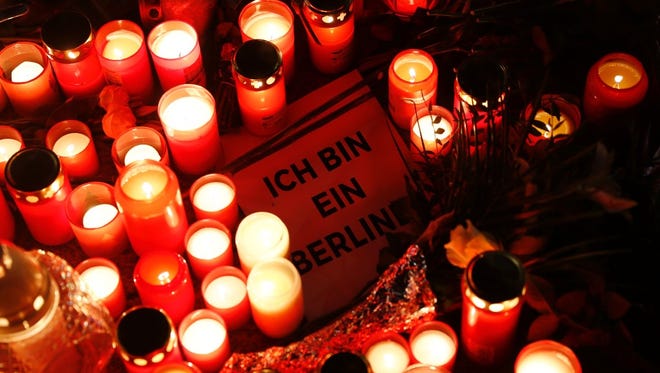After Christmas market attack, Berlin shaken but still stoic

BERLIN — The deadly truck attack on a Christmas market and the manhunt for the assailant has unnerved many Germans who nevertheless say they intend to maintain their sense of stoicism.
Jakob Baum, 46, a chemical engineer who was passing by Brandenburg Gate, one of Germany's best-known landmarks and a symbol of the country's reunification in 1990, said it was important Germans "set an example" to the world by not showing "knee-jerk" reactions.
What we know about Tunisian suspect in Berlin attack
"Germans don't freak out," said Amir Moshiri, 25, a student from Cologne who was posing for pictures with his girlfriend outside the gate. "We just get on with things. Berlin or anywhere else in Germany is no different now to how it was last week or before that, no matter who committed this crime. Germans don't immediately react with extreme emotions or decisions and nor should we."
Still, it can be difficult to always mask one's true feelings.
"How could they do this just a few days before Christmas when people were out celebrating and enjoying themselves with their families," said Ahmad Talep Agha, 24, a Syrian refugee who lives in Berlin. "It really is too upsetting and I don't understand it," said Agha, who is Muslim. "It is so terrible."
The aftermath scenes of Islamic State-claimed attacks, whether in European capitals or the United States, have become depressingly familiar.
Germany hunts 'armed' Tunisian suspect in truck attack
Deadly Berlin truck attack: What we know
Forensic teams examine and then remove the bodies. The blood is washed away. Candles, heartfelt notes and defiant signs appear on makeshift memorials. Security services and police descend on key thoroughfares, landmarks and transportation hubs — in a sign of strength but also to reassure worried citizens that their government is taking action.
That was the case in Paris, Brussels and Nice. It has been true for Berlin as well with Monday's attack that killed 12 — but not entirely, at least on the surface.
While Germany's security forces are on high alert, there has been no obvious or apparent rush to fill the streets with heavily-armed police or security personnel, even though the suspected perpetrator, a Tunisian national with a string of aliases, remains at large and is, according to a European arrest warrant, considered armed and dangerous.
Major attractions and sites such as the Brandenburg Gate, Germany's Parliament, Berlin's main train station and the Federal Chancellery, where German leader Angela Merkel has her office, did not have any more visible security than normal when USA TODAY visited Wednesday.

In fact, Merkel's office had the same number of guards patrolling its perimeter as it always does: None.
"If we secure everything ... then that will be at odds with our culture of openness," Berlin mayor Michael Müller said.
"I think our government's decision to let the refugees come in was the right thing to do and I still think so," said Matthias Garbsch, 34, a software engineer from Hamburg who was paying his respects to the dead Wednesday outside Kaiser Wilhelm Memorial Church, the damaged tower that sits to one side of the Christmas market struck Monday. The area around this market has reopened, although the wooden booths and stalls remain closed. There are Christmas lights and paraphernalia but little seasonal cheer.
Garbsch shared Moshiri's view that even if the attacker turns out to be an asylum seeker, Merkel should not suddenly change her refugee policies.
Not everyone agrees with that. This attack has horrified Germans. There are calls by Merkel's political opponents for her to take responsibility for the assault. Merkel's government passed a package of security bills Wednesday aimed at increasing video surveillance, but they still need parliamentary approval and were in response to earlier attacks.
"We must not be under any illusion. The environment for such deeds was imported negligently and systematically throughout the last year and a half," said Frauke Petry, the leader of Alternative für Deutschland, a right-wing party that has consistently attacked Merkel's refugee policy that allowed a million asylum seekers to come to Germany last year.
Odeh Diab, 20, a Syrian refugee and rapper who was coming out of Berlin's main refugee-processing center on Wednesday, agreed with some of Petry's words.
"Germany should let people like me come but it should also find out who they are before it does. Some of them are interested in going straight to Hell."